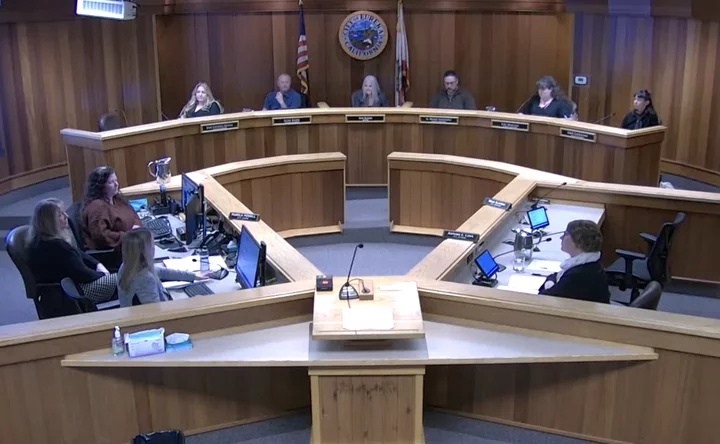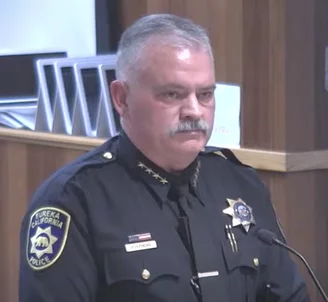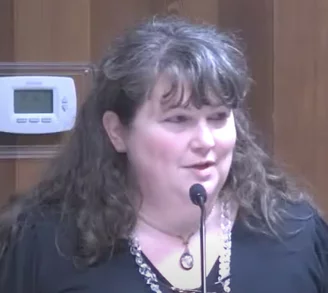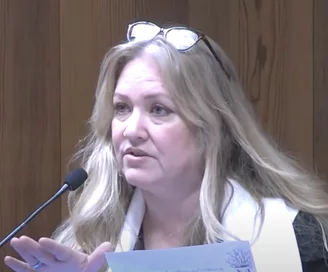Screenshot of Tuesday’s Eureka Council meeting.
###
PREVIOUSLY:
- Eureka City Council Tables Decision on Police Surveillance Cameras, Citing Privacy Concerns
- Eureka’s Police Oversight Board Weighs Pros and Cons of Automated License Plate-Reading Cameras; City Council to Review Draft Policy Next Week
###
Last night, the Eureka City Council unanimously voted to reject a proposal from the Eureka Police Department to install nearly two dozen automated license plate-reading (ALPR) cameras throughout the city, citing concerns over privacy protections and data sharing.
The council’s decision came after nearly two hours of impassioned public comment where all but one speaker urged the council to vote against the proposal. The vast majority of the 50-odd commenters worried that the information could be obtained by federal immigration officials and used to target undocumented community members.
The technology, provided by Georgia-based manufacturer Flock Safety, uses stationary cameras to automatically collect license plate details from passing vehicles. That encrypted data is stored and cross-referenced against a database of vehicles of interest, often termed a “hot list,” which may include vehicles associated with active investigations, missing people, or those implicated in criminal activities. When a match is found, a real-time alert notifies police of the location where the image of the vehicle was captured.
Eureka Police Chief Brian Stephens introduced the draft policy to the city council last October, noting at the time that ALPR technology “truly has the capability to be a force multiplier” for the department. The council opted to table its decision until the city’s Community Oversight on Police Practices (COPP) board had a chance to review the draft policy and offer its own recommendations, which it did at its quarterly meeting last week.
Speaking at last night’s meeting, Stephens said he’s been working with City Attorney Autumn Luna, City Manager Miles Slattery and OIR Group, the city’s independent police auditor, to incorporate additional oversight measures into the draft ALPR policy, which was modeled after best practices issued by Lexipol, a private company that provides policy guidelines and training standards for law enforcement agencies across the country.
“The issue of privacy is obviously the overbearing concern, not only stemming from the potential implementation of this technology in our community but in our society as a whole,” Stephens said. “As a chief of police, I can’t address that fear and concern on a national level but I can address it on a local level, as it relates to the implementation use of the Flock … and hopefully lessen that fear and concern surrounding the technology.”
Speaking via Zoom, Flock Community Affairs Manager Kristin MacLeod noted that the company uses end-to-end encryption to ensure data integrity. She emphasized that the company does not use AI or facial recognition technology to “make enforcement recommendations.”
“Nor is it predictive policing,” she said. “We’re not predicting where or when crime occurs. [Our] technology takes the information contained in the still images and organizes it into [a] searchable database … .”
The Humboldt County Sheriff’s Office implemented the county’s ALPR program in April 2024. The Blue Lake Rancheria recently signed a contract with Flock, Stephens said, for eight cameras on the rancheria and along State Route 299. Other local law enforcement agencies have looked into technology as well, including the Arcata, Fortuna and University police departments.
Councilmember G. Mario Fernandez asked for an example of how ALPR technology would be used. Stephens recounted a “horrific investigation” where a man was set on fire in broad daylight and it took EPD officers over six hours to track down the suspect. “It took us three hours to search … cameras in that area to find a photograph of the vehicle, and then it took another three hours for officers to scour the City of Eureka to find that vehicle parked somewhere and arrest that suspect,” he said.
If the city had Flock’s cameras at the time, EPD could have entered the vehicle’s description into the system and likely known which direction the suspect was traveling, Stephens said. “We [could have] cut it down into an hour, and this individual wouldn’t have had any chances to hurt anyone else,” he explained. “It helps us focus the manpower that we do have in the right place to get them to the suspect in a lot quicker time frame.”
Councilmember Kati Moulton asked what protections the California Values Act would provide for undocumented residents under the draft policy, and if EPD would be required to share ALPR data with federal immigration officials.
“[The policy says] a law enforcement official shall have discretion to cooperate with immigration authorities only if doing so would not violate any federal, state, local law or local policy,” Moulton said. “And then there’s a long list of exceptions for both federal and state agencies to request information … . Am I right to understand that there are exceptions to the California Values Act where we would have to turn over information about somebody being in Eureka or being seen on our cameras?”
If the person in question is a suspect of a crime, yes, Stephens said. “Additionally, if a federal agency came to us with a court order, a subpoena [or a] federal search warrant, then they could also have access to that [data] … because [the order] came from a judge, not from an agency themselves.”
However, if there were any “legal concerns” surrounding the authenticity or legality of the subpoena, the matter would be heard in court, Stephens said.
“What would happen if the City of Eureka got a federal subpoena for information and then refused to turn over that information?” Moulton asked.
“We could be subject to court sanctions at that point,” Luna responded. “So with a judicial warrant for the release of information, I think the city would be beholden to that warrant.”
During the two-hour public comment portion of last night’s meeting, dozens of speakers urged the city council to deny the contract to protect the privacy of its citizens. Eureka resident Kendall Finch expressed concern for marginalized communities who could be disproportionately impacted by increased surveillance measures.
“One of Trump’s first initiatives in his last administration was an attempt to end Deferred Action for Childhood Arrivals (DACA),” Finch said. “These are loved ones and neighbors, they’re folks who grew up in the U.S. If DACA ends, cameras like these make these folks easier to find and target, and a Flock contract specifically would put their data in the hands of out-of-state agencies we have no control over.”
Eureka resident Scott Palmer said he was “wildly against” the proposal and questioned whether Flock’s encryption methods would remain effective in the months and years to come.
“Even if today’s perfect encryption is wonderful, is it going to be that in six months?” he asked. “[W]e’re looking at a slippery slope. … Let’s protect our community, but [this technology] doesn’t stop nefarious things from happening. … I believe wholeheartedly in giving [EPD] everything they need to keep this community safe and to deal with the very significant issues that face us on a regular basis. … I believe wholeheartedly that the chief will run a tight ship and keep a good eye on all this, but … I don’t know who’s going to be in charge of it five years from now or 10 years from now.”
COPP board member Melinda Ciarabellini was the only person who spoke in favor of the proposal, though she noted that her opinion was her own and not that of the COPP board.
“The use of this technology will greatly enhance EPD’s effectiveness in criminal investigation,” she said. “[T]he potential benefits of using this technology as another tool in the toolbox, as we say, far outweighs any concerns you may have about privacy issues or thoughts about the potential misuse of the system by EPD officers, especially considering that the data being collected is a photograph of the back of a vehicle and a license plate that’s taken while on a public road — that’s it.”
Ciarabellini emphasized that there are “many, many safeguards” built into the draft policy to address potential abuse by EPD officers and administrators.
“For example, access to and use of the ALPR system requires all users, administrators and officers to have individual credentials — like a PIN or a password — and that log-in and log-out information is subject to audit,” she continued. “Consider what may happen if you choose not to approve the use of ALPRs in the City of Eureka. Your strained police force will be left without this vital tool to help identify and apprehend criminals leaving the scene of a crime or committing crimes in progress.”
Councilmember Leslie Castellano echoed some of the concerns expressed during public comment and emphasized the importance of “building community trust.” She also felt the $74,000 that would be spent on the installation and first year of Flock’s services could be spent in better ways and made a motion to deny the proposal. The motion was simultaneously seconded by Fernandez and Moulton.
Councilmember Renee Contreras-DeLoach expressed her appreciation to staff who put their time into developing the draft policy and EPD officers “for the good work they’re doing in our community,” but said she would also be voting against the proposal. “I know that there’s a good intention here, and it’s to be able to solve crimes for us and make things safer because we are dealing with some issues here in our community.”
Councilmember Scott Bauer noted that Eureka “is a small city with big city problems” and acknowledged that Flock’s technology could serve as a tool to address some of those problems. But like his fellow councilmembers, Bauer felt the potential negative impacts and unintended consequences of the technology outweighed the benefits.
“I do want to recognize that there’s no malintent by EPD or the chief — this is purely [our city] trying to figure out a way to make people feel safer in the community,” he said. “It’s hard to support this tool when there’s so much concern from all of us, frankly. I hope we can figure out another way to help the public feel safe in their community and help our police force … .”
The motion to deny the camera-reading technology proposal passed 5-0.




CLICK TO MANAGE